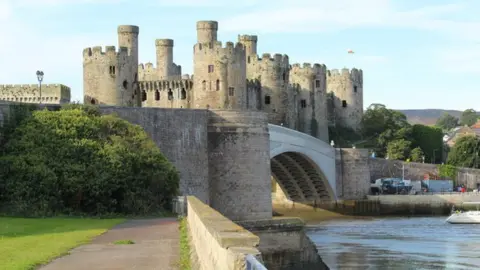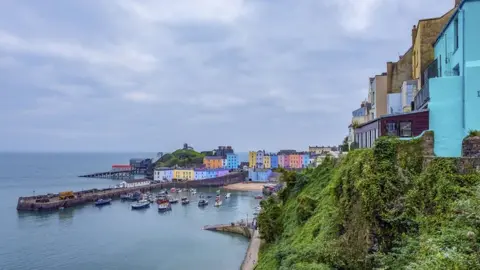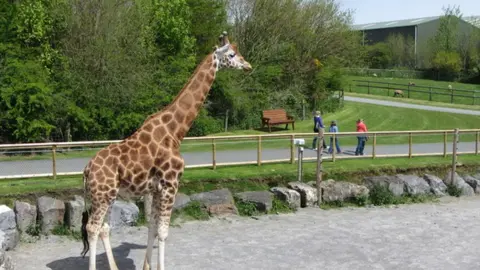Coronavirus: Tourism economy in Wales on 'brink of collapse'
 Richard Hoare/Geograph
Richard Hoare/GeographWales' tourism industry is on the "brink of collapse", say a group of Welsh tourism leaders demanding a reopening plan from the first minister.
Official figures say £6.3bn was spent in Wales due to tourism in 2018 but attractions, shut in lockdown, say they have had "no reopening information".
The Welsh Association of Visitor Attractions claim government "inaction" may lead to "economic disaster".
Welsh Government said reopening tourism "is at the forefront of our minds".
Tourism in Wales directly supports about 120,000 jobs - almost 10% of Wales' workforce - and contributes 6% of all Gross Value Added to the Welsh economy.
People in Wales can currently meet others from another household outdoors but are advised to travel no more than five miles as a "rule of thumb" because of the coronavirus pandemic.
But with most of Wales' attractions and tourism businesses closed since last autumn - through the winter and now the coronavirus lockdown - they want "urgent clarity".
"We now face the real and fragmenting prospect, because of your very restrictive and separate set of pandemic lockdown policies, of a 2020 summer season that may never happen," the WAVA statement read.
"The result would be catastrophic for the tourism industry in Wales.
"Whilst once being protective, the Welsh Government's policies are now, as we are in the middle of June, causing further damage unless there is urgent change."
The statement says Welsh Government is causing harm because of "its continued stance of remaining closed for business and travel" and the borders are "effectively shut".
The group's new plea to Mark Drakeford follows what they claim was an answered letter to the first minister last month and warns "the Welsh tourism industry is on the brink of collapse' and "without a clear roadmap to reopening such as those published in England, Scotland and Northern Ireland, the government is causing harm".
 oksanaphoto/Getty Images
oksanaphoto/Getty ImagesThe letter is signed by more than 60 of Wales' top leisure industry bosses from a range of high profile tourist destinations including Folly Farm, Snowdon Mountain Railway, Zip World, National Showcaves Centre for Wales and the National Botanic Garden of Wales.
"This is now heading towards its obvious end result of businesses taking measures to limit their losses, even if this will cause long-term damage to the regional economy and local communities," the association statement continued.
"The reality is that many businesses are on the brink of collapse. The impact on direct and indirect jobs will be significant in both the immediate period but also for many years to come as the economic generators will be lost."
Tourism bosses say Wales' message that "Wales is shut, don't come and don't plan on coming" is the "most incredibly damaging message".
"Welsh tourism will be left behind not only in 2020 but for a number of years," added the statement.
 Geograph/Gareth James
Geograph/Gareth James "We are supportive of the first minister's aim to protect the health of people in Wales however this aim must be in the wider context of the long-term health of individuals and the ability of the Welsh economy to recover.
"We have a major concern that a narrow focus on immediate matters will cause irreparable damage in the long term (and to future levels of investment) - this is a concern that has been addressed in other parts of the UK and Europe, and we see Wales at odds for no valid reason with these concerns."
The Welsh Government had previously said it "hopes to be able to say something positive" for the tourism industry when lockdown restrictions are reviewed in July, with 9 July a possible date for a decision.
"We don't want the sector to be in any doubt at all that the safe reopening of the tourism economy is at the forefront of our minds," said a Welsh Government spokesperson.
"We hear what businesses are saying and are acutely aware of the challenges they are facing but we have to be guided by the medical and scientific advice to ensure we only lift restrictions when they are safe to do so.
"It is also crucial the sector knows that together with other nations we are fiercely lobbying for additional financial support from the UK government."
